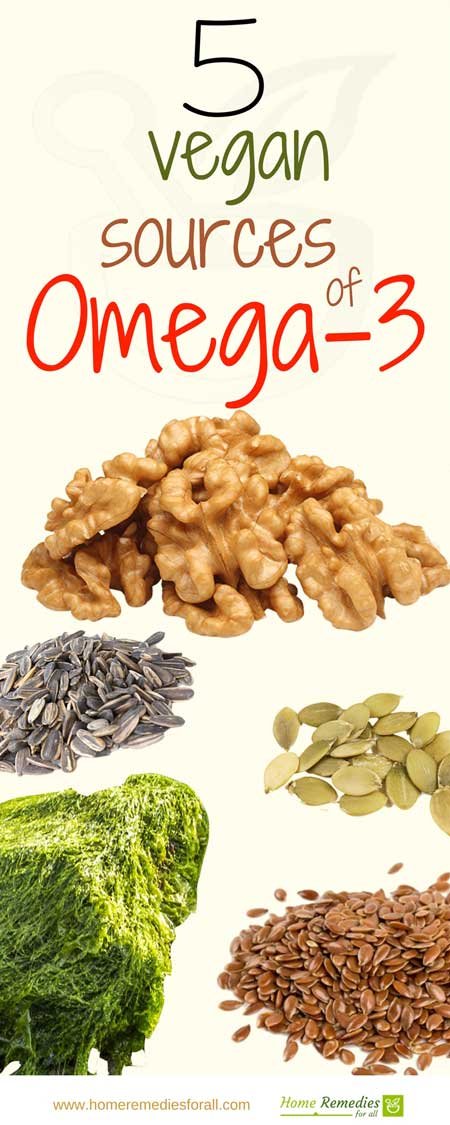Omega 3 fatty acids offer multiple health benefits including reduction in triglycerides, depression, asthma, ADHD, dementia and Alzheimer disease.
Rich and popular sources of Omega 3 fatty acids are fish oil and fatty fishes such as salmon, mackerel, trout and tuna.
Out of the 3 different types of Omega 3 fatty acids, eicosapentaenoic (EPA) and docosahexaenoic (DHA) are the most active types offering all the health benefits. The other one Alpha linolenic acid (ALA) is not active. It should convert to EPA and DHA to provide the health benefits.
Plant based Omega 3 fatty acids generally contain ALA whereas fish based are rich in EPA and DHA. Our body converts less than 5% of ALA to EPA and less than 1% to DHA. Therefore, you have to consume more quantities of plant based omega-3 fatty acids to get the same benefits provided by the fish and fish oil based Omega-3.
Top 5 Plant Based Omega-3 Sources

Following are fine plant-based rich sources of Omega 3 fatty acids. Most of these are nuts and seeds, although some vegetables also contain small quantities of Omega-3.
1 Algal Oil
This is perhaps the best known source of beneficial Omega 3 fatty acids from the plants.
- Contains EPA and DHA similar to fishes and fish oils
- Gets absorbed as easily as the seafood sources of Omega 3
- Improves memory as found in one of the animal studies
- Requires more research as currently very few research papers are available.
- Supplements are available in both capsules and liquid forms.
You can take supplement capsules based on recommended doses by the manufacturer. Liquid form of algal oil can be used in smoothies and other food products to extract maximum health benefits of Omega 3 fatty acids.
2. Chia Seeds
In addition to the Omega 3 fatty acids Chia seeds also contain many other healthy ingredients such as fibre and proteins.
Rich source of Alpha linolenic acid ALA
Decrease risk of chronic diseases
Lower triglycerides and glucose intolerance
Increases beneficial HDL cholesterol
Lowers inflammation
You can add Chia seeds to your salad, smoothies and other food items. You can use both Sara and ground Chia seeds in any food items where it can add taste and nutrition.
3. Flax Seeds
Flax seeds are also very high in Omega 3 contents as well as a rich source of fiber, proteins and minerals like manganese and magnesium.
- Lower cholesterol and proved in multiple scientific researches
- Lowers high blood pressure
- Improve overall heart health
Freshly ground flax seeds become more active and get absorbed fast in the body. Flaxseed oil is also equal to a powerful source of Omega 3 fatty acids in a concentrated form. Add them to your food snacks and so this to get the best out of flax seeds.
4. Hemp Seeds
Hemp seeds are not only rich in Omega 3 fatty acids but are also good sources of essential minerals like iron, magnesium and Zinc and proteins
- Improve heart health
- Prevent blood clotting help in faster recovery from and heart attack according to some studies
- Hemp seed oil is a more concentrated form of Omega 3 fatty acids
These seeds can add taste and crunchiness to your snacks. Sprinkle them on your salads , add grounded hemp seeds to smoothies and yogurts to enjoy good health.
5. Walnuts
Walnuts are full of different types of fats. In fact two-thirds of walnuts are just fat.
- Rich source of Alpha linolenic acid ALA
- Improve brain health due to presence of Omega 3 fatty acids according to many studies
- Lower anxiety
- Increase learning and memory
You can simply consume a handful of these crunchy nuts to derive all the health benefits. Add them to your oatmeal, snacks, salads, smoothies and yogurts.
Other plant based sources are cruciferous vegetables like brussel sprouts, broccoli and kale. They contain smaller quantities of Omega 3. Their cooked versions produce almost 3 times more Omega-3 fatty acids yet they are too small for daily value.

